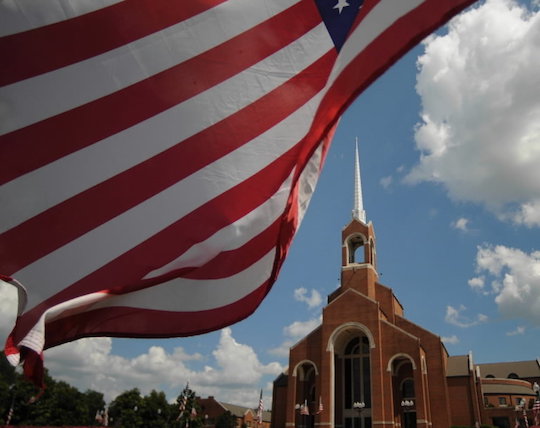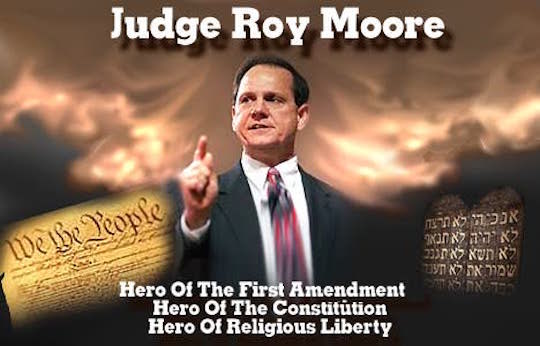When we think about the separation of church and state, we tend to worry about government becoming more like church. But maybe the real danger lies in churches becoming more like governments—by getting a piece of the state’s monopoly on violence, for instance. Yesterday, the Alabama state senate approved a bill to let Briarwood Presbyterian Church assemble its own police force. Briarwood police would be sworn officers with the same authority to carry firearms, issue citations and place people under arrest as, for example, university police. The difference is that they would be employed by a church. That’s tricky, since as police they would become expressions of state power. I’m using “tricky” here to avoid repeating the exact words of the ACLU of Alabama, whose executive director described the plan as “plainly unconstitutional.”
Tag Archives: alabama
Friday links! Conspiracy theories edition
Between global warming and Fetty Wap, it sure seems like we have a lot of problems lately. But what if our problems were conspiracies? Wouldn’t it be easier to address things like income inequality or adult-sized Batman t-shirts if they were not, in fact, problematic consequences of flawed systems, but rather stuff people were secretly doing to us? Or stuff lizards were secretly doing to us? We can’t know until we pit MacGyver against Nancy Drew, but I’m pretty sure it’s easier to stop a conspiracy than to solve a problem. Today is Friday, and I’d rather be up against the Rothschilds than structural conflicts of liberal democracy. Won’t you theorize with me?
Alabama Chief Justice defies federal ruling on gay marriage
Last month, US District Court Judge Callie VS Granade declared Alabama’s ban on same-sex marriage unconstitutional. The state was supposed to start issuing licenses to gay couples—known regionally as “Ted and Earl”—this morning, but last night Alabama Supreme Court Chief Justice Roy S. Moore ordered probate judges not to do it. “Effective immediately,” he decreed, “no probate judge of the State of Alabama nor any agent or employee of any Alabama probate judge shall issue or recognize a marriage license that is inconsistent” with Alabama’s constitution—which includes a defense of marriage amendment that passed in 2006 with 80% of the vote. Now seems like a good time to point out that Judge Moore’s position is popularly elected.
Ask a white person: Is this racist?
Smick sent me a link to this long essay ostensibly by a teacher at a predominantly black high school, supposed to have first appeared in the Rants & Raves section of Mobile, Alabama Craigslist. It appears all over the internet with that attribution, although the original has yet to be found. It reached Smick via a chain email, and he sent it to me with the possibly facetious question, “Is this racist?” Spoiler alert: yes, the essay is extremely racist. Besides repeatedly using the phrase “the blacks,” it also contains this paragraph:
One might object that there are important group differences among blacks that a white man simply cannot detect. I have done my best to find them, but so far as I can tell, they dress the same, talk the same, think the same. Certainly, they form rival groups, but the groups are not different in any discernible way. There simply are no groups of blacks that are as distinctly different from each other as white “nerds,” “hunters,” or “Goths,” for example.
Bob Parks described it as “the kind of truth that is often taken back out of PC fear.” He would have sourced it better, but his nephew was visiting him at his cabin.
Santorum wins two raddest states

Lawyers, back me up: if a man is wearing boxing gloves, you can legally hit him in the mouth, right?
Miracle Mike Sebba and I used to amuse ourselves by discussing where and when in world history we would most like to live—Paris in the twenties, Greenwich Village in the fifties, Plato’s Athens, Da Vinci’s Venice. Strangely, Alabama and Mississippi never came up. At no time in recorded history was either of those states any fun. Even under the Cahokia—arguably its peak civilization, and certainly the one that consumed the least Jack-In-the-Box—Mississippi was a terrible place to live. And Alabama in the early sixties was an exciting, historically significant milieu only in context of the shittiness of all previous Alabamas. Both states consistently vie for the lowest literacy rate in the Union. But they were able to put aside their rivalry to agree on one thing: they love Rick Santorum.




